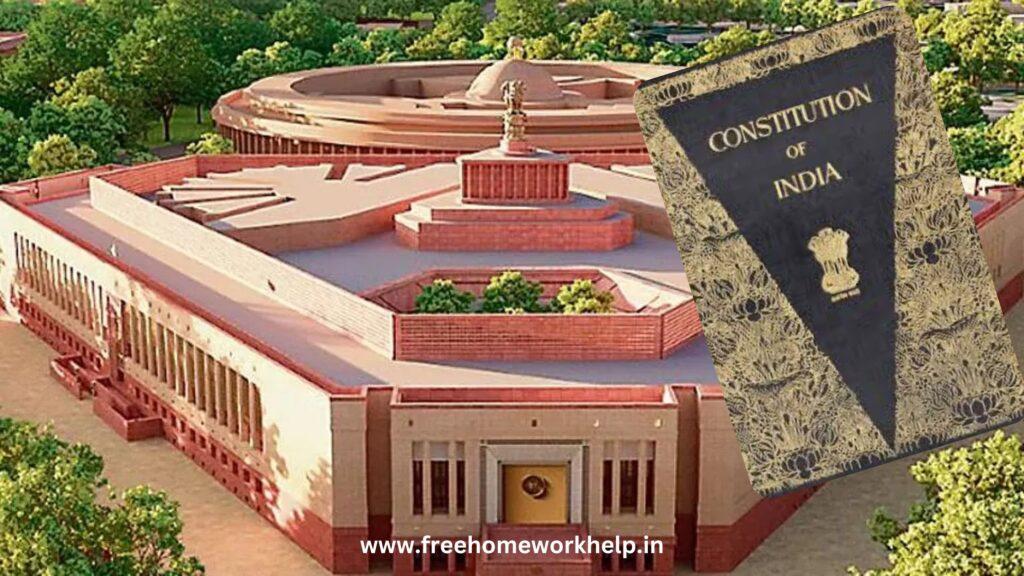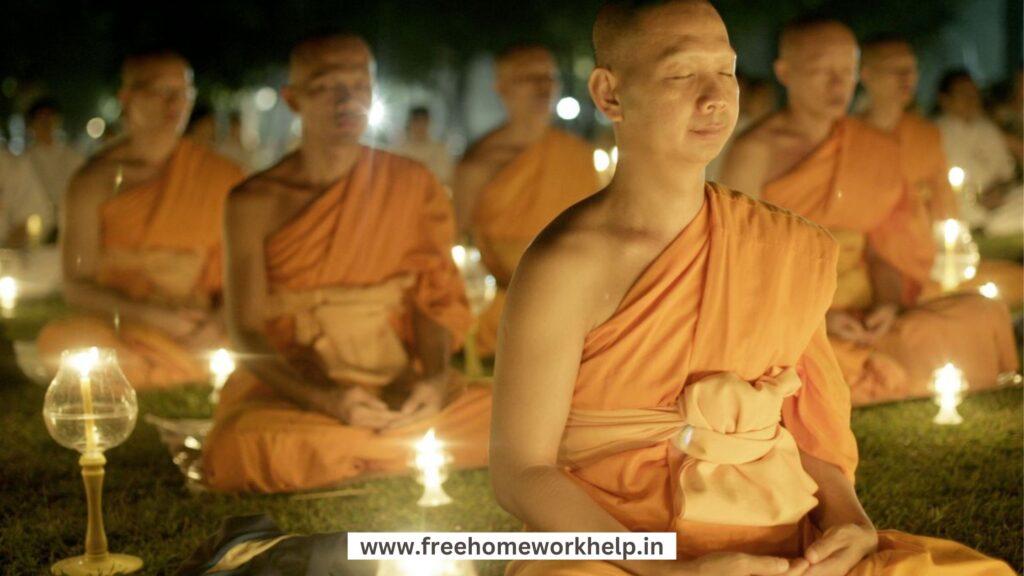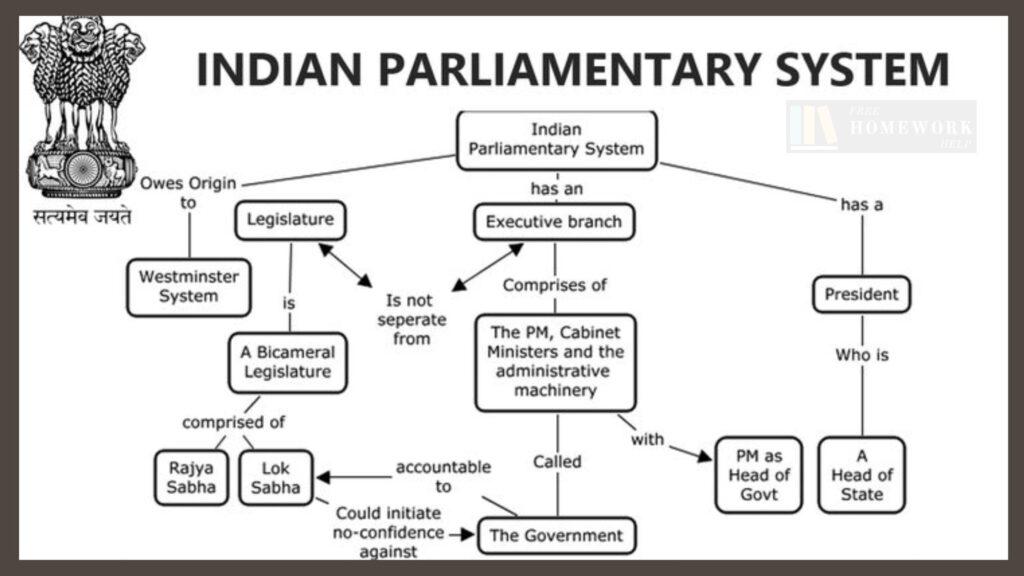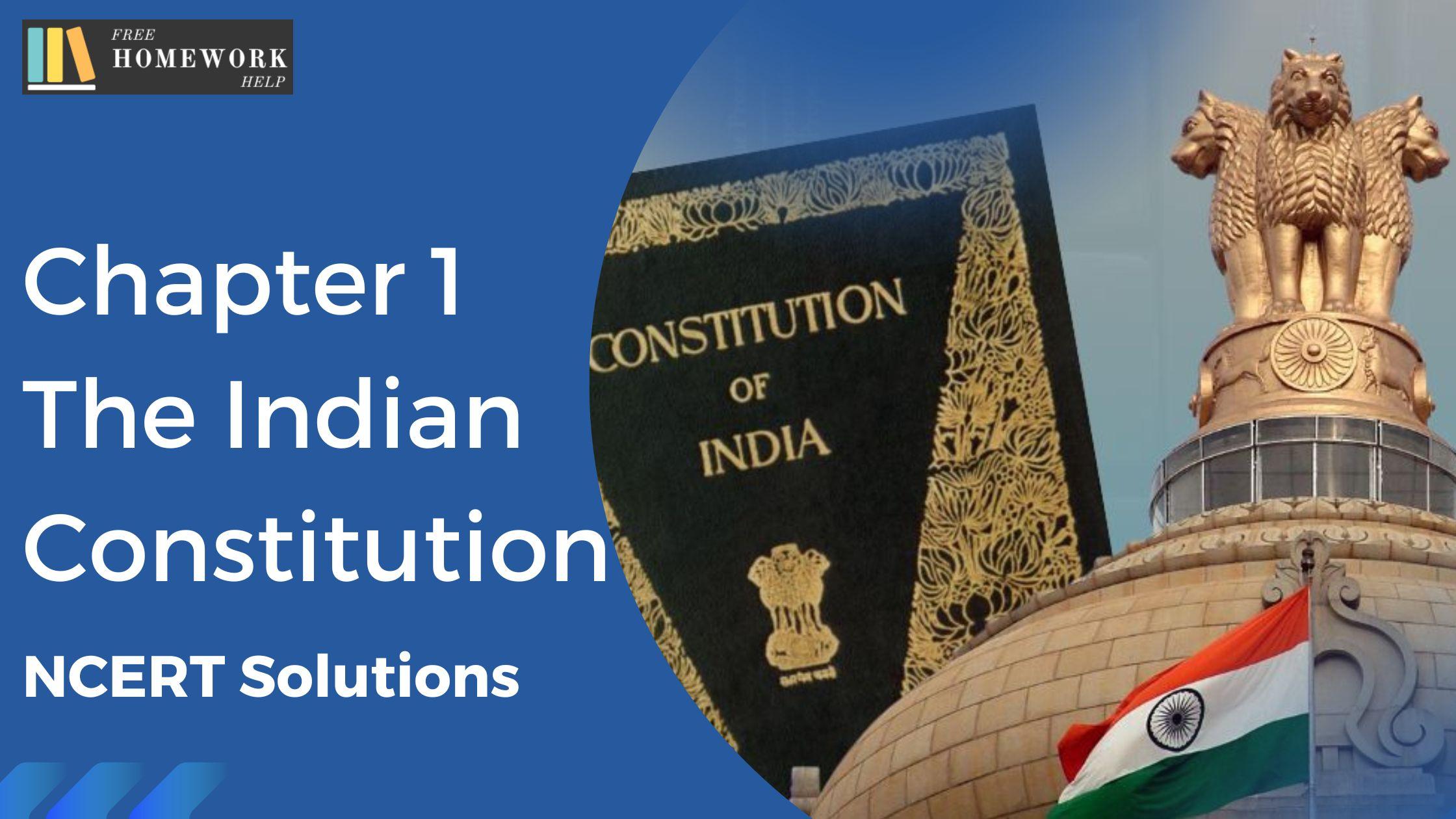The Indian Constitution is a document that lays the foundation for the functioning of India as a democratic country. Class 8 Political Science Chapter 1 provides a comprehensive understanding of Ncert’s solutions to the Indian Constitution. This blog provides easy concepts for students to study and score good marks in the board exams. By studying these answers, students will gain a deep knowledge of the democratic values that guide our nation.
NCERT Solutions
Exercises
1. Why does a democratic country need a Constitution?
Answer: A democratic country needs a Constitution for the following reasons:
i) It is the supreme law of the land, that provides a legal framework for the structure and powers of the government.
ii) It guarantees fundamental rights and freedoms to citizens, such as the right to equality, freedom of speech.
iii) It establishes the principle of the rule of law which ensures that no one is above the law.
iv) It provides stability and continuity in governance.
v) It defines the separation of powers among the legislative, executive, and judicial branches of government.

2. Look at the wording of the two documents given below. The first column is from the 1990 Nepal Constitution. The second column is from the more recent Constitution of Nepal.
| 1990 Constitution of Nepal Part 7: Executive | 2015 Constitution of Nepal Part 7: Federal Executive |
| Article 35: Executive Power: The executive power of the Kingdom of Nepal shall be vested in his Majesty and the Council of Ministers | Article 75: Executive Power: The Executive Power of Nepal shall, pursuant to this Constitution and law, be vested in the Council of Ministers |
What is the difference in who exercises ‘Executive Power’ in the above two Constitutions of Nepal?
Answer: The difference in who exercises ‘Executive Power’ in the two Constitutions of Nepal is as follows:
In the 1990 Constitution of Nepal, the executive power was vested in the King, who held the position of the head of state and the Council of Ministers.
However, in the more recent 2015 Constitution of Nepal, the executive power is vested by the Council of Ministers based on the laws mentioned in the Constitution of the country.

3. What would happen if there were no restrictions on the power of elected representatives?
Answer: If there were no restrictions on the power of elected representatives, they may misuse their authority for personal gain, engage in corruption, and disregard the rights and interests of the people.
4. In each of the following situations, identify the minority. Write one reason why you think it is important to respect the views of the minority in each of these situations.
(a) In a school with 30 teachers, 20 of them are male.
Answer: In the given situation, the minority would be the female teachers. It is important to respect the views of the minority in this situation because gender equality has crucial values in society. It promotes fairness and equal opportunities for all teachers, regardless of their gender, creating a more conducive and harmonious work environment.
(b) In a city, 5 percent of the population are Buddhists.
Answer: In the given situation, the minority would be the Buddhists. It is important to respect the views of the minority in this situation because It recognizes and values the diversity of religious beliefs within the city. It encourages understanding between different religious groups.

(c) In a factory mess all employees, 80 percent are vegetarians.
Answer: In the given situation, the minority would be the non-vegetarian employees. It is important to respect the views of the minority in this situation because it encourages mutual understanding and tolerance among coworkers, leading to better relationships and a harmonious work atmosphere.
(d) In a class of 50 students, 40 belong to more well-off families.
Answer: In the given situation, the minority would be the students belonging to less well-off families. It is important to ensure that they do not feel humiliated due to their inability to contribute to various school expenses.
5. The column on the left lists some of the key features of the Indian Constitution. In the other columns, write two sentences, in your own words, on why you think this feature is important:
| Key Feature | Significance |
| Federalism | |
| Separation of Powers | |
| Fundamental Rights | |
| Parliamentary Form of Government |
Answer:
| Key Feature | Significance |
| Federalism | i. It protects regional autonomy and local interests. ii. It promotes unity amidst diversity. |
| Separation of Powers | i. It ensures that power is not concentrated in the hands of a single entity. This division helps prevent abuse of power and promotes a system of checks and balances. ii. Each branch of government -The legislative, executive, and judicial are accountable for its actions. |
| Fundamental Rights | i. Fundamental Rights give every citizen of the country the right to be considered equal, not to get discriminated against based on caste, culture, or religion, ii. All citizens get equal educational opportunities and are equal in front of the law. |
| Parliamentary Form of Government | i. In this form of government, the citizens of the country have the right to elect their representatives. ii. Every citizen of the country, irrespective of caste, color, creed, and religion, would have the right to elect their leaders under the right to vote will be given to all. |

6. Write down the names of the Indian states which share borders with the following Neighbouring nations:
(a) Bangladesh
(b) Bhutan
(c) Nepal
Answer: (a) Bangladesh-West Bengal, Meghalaya, Assam, Tripura, Mizoram
(b) Bhutan-Sikkim, West Bengal, Assam, Arunachal Pradesh
(c) Nepal- Uttrakhand, Uttar Pradesh, Bihar, West Bengal, Sikkim
In-Text Questions Class 8 Political Science Chapter 1
Textbook Page 6
1. Discuss with your teacher what you understand by the term ‘constitutive’. Provide one example of ‘constitutive rules’ from your everyday life.
Answer: The term ‘constitutive’ means essential which helps to establish the structure of a system.
Constitutive rules are fundamental rules that shape the functioning and behavior within a particular system.
An example of a constitutive rule from everyday life is the rule of turn-taking in a conversation. When engaging in a conversation, it is commonly understood and expected that participants take turns speaking and listening.
2. Why did the people of Nepal want a new Constitution?
Answer: The people of Nepal wanted a new Constitution because the existing constitution was drafted during the time of monarchy and did not align with their aspirations for a democratic society. They wanted to change it from a monarchy to a democratic government. They wanted such a type of constitutional framework that reflect the values and principles they had fought for.
Textbook Page 7
3. In what way is the class monitor misusing his power?
Answer: The class monitor is complaining about innocent students to the teacher. The teacher will punish them for not doing anything wrong. In this way, the class monitor is misusing his power.
4. In which of the following situations is a minister misusing his power:
a) refuses to sanction a project of his ministry for sound technical reasons;
b) threatens to send his security staff to rough up his neighbor;
c) calls up the police station asking them not to register a complaint that is likely to be filed against his relative.
Answer: b) threatens to send his security staff to rough up his neighbor;
c) calls up the police station asking them not to register a complaint that is likely to be filed against
his relative.
Textbook Page 8
5. Who is in the minority in the above storyboard? In what way is this minority being dominated by the decision taken by the majority?
Answer: In the above storyboard, girls are in the minority. There is an unequal distribution of interests between boys and girls. The girls express their desire to play basketball, while the boys prefer cricket.
After listening to both sides, the teacher suggests alternating between the two sports on different days, ensuring that everyone gets a chance to participate in their preferred activity & ensures that no minority is dominated.
Textbook Page 9
6: Why was Shabnam happy that she had not watched TV? What would you have done in a similar situation?
Answer: Shabnam was happy that she had not watched TV because there were so many questions in the test from those chapters that she revised yesterday. If she watched TV, she couldn’t attempt the test correctly.
I would have made a similar decision to prioritize studying, just like Shabnam did.
Textbook Page 10
7. Let us recap the reasons why the Constitution plays an important role in democratic societies by recalling the constitutive rules that you have read about through these examples:
| Example | Constitutive Rules |
| The people of Nepal adopted a new Constitution after the success of the people’s movement for democracy. | It lays down ideals that define the kind of country that we want to live in. |
| Suresh, the class monitor wrongly picks on Anil, his classmate. | |
| The girls do not get to play basketball because the boys are a majority in class. | |
| Shabnam decides to revise her chapters instead of watching TV. |
Answer :
| Example | Constitutive Rules |
| The people of Nepal adopted a new Constitution after the success of the people’s movement for democracy. | It lays down ideals that define the kind of country that we want to live in. |
| Suresh, the class monitor wrongly picks on Anil, his classmate. | The Constitution establishes rules to prevent the misuse of power by political leaders. |
| The girls do not get to play basketball because the boys are a majority in class. | It includes rules to prevent the exclusion of minorities from routine opportunities available to the majority. |
| Shabnam decides to revise her chapters instead of watching TV. | We may have strong feelings about an issue that conflict with our broader interests. |
Textbook Page 13
8. Discuss the difference between State and Government with your teacher.
Answer:
| State | Government |
| It is a political situation that represents a sovereign people who occupy a definite territory. For example, the Indian State | It is the body responsible for the administration and decision-making within the State. |
| It represents the entire political system, such as the legal framework, institutions, and sovereignty of a country. | It represents the executive branch of the State and exercises political authority on behalf of the State. |
| It establishes the fundamental principles, laws, and policies that govern the country. | It implements and enforces these laws and policies on a day-to-day basis. |
Textbook Page 14
9. Which Fundamental Rights will the following situations violate :
- If a 13-year-old child is working in a factory manufacturing carpets.
- If a politician in one state decides to not allow laborers from other states to work in his state.
- If a group of people is not given permission to open a Telugu- medium school in Kerala.
- If the government decides not to promote an officer of the armed forces because she is a woman.
Answer:
- Right against Exploitation
- Right to Freedom
- Cultural and Educational Rights
- Right to Equality
Textbook Page 15
10. The Constitution also mentions fundamental duties. Find out with the help of your teacher what these include and why it is important for citizens in a democracy to observe these.
Answer: The ten fundamental duties are as follows :
- To abide by the Constitution and respect its ideals and institutions, the National Flag, and the National Anthem.
- To cherish and follow the noble ideals which inspired our national struggle for freedom.
- To uphold and protect the sovereignty, unity, and integrity of India.
- To defend the country and render national service when called upon to do so.
- To promote harmony and the spirit of common brotherhood amongst all the people of India transcending religious, linguistic, and regional or sectional diversities; to renounce practices derogatory to the dignity of women.
- To value and preserve the rich heritage of our composite culture.
- To protect and improve the natural environment including forests, lakes, rivers, and wildlife, and to have compassion for living creatures.
- To develop the scientific temper, humanism, and the spirit of inquiry and reform.
- To safeguard public property and to abjure violence.
- To strive towards excellence in all spheres of individual and collective activity so that the nation constantly rises to higher levels of endeavor and achievement.
It is important for citizens in a democracy to observe these for the progress, harmony, and well-being of the nation.
Conclusion
The Ncert Solution Class 8 political science chapter 1 provides students with a comprehensive understanding of the Indian Constitution. By studying and practicing this Ncert solution, students can enhance their knowledge, improve their problem-solving skills, and perform better in their exams. You can access them by visiting the website. If you have any other queries about Ncert Class 8 political science chapter 1 “The Indian Constitution” feel free to reach us so that we can revert back to us at the earliest possible.
FAQ
1. What is the name of chapter 1 in class 8 Political Science?
The name of Chapter 1 in Class 8 Political Science is The Indian Constitution.
2. What is Constitution Class 8?
A constitution is a set of fundamental principles or rules that define the structure, powers, and limitations of a government.
3. Who is the father of the Indian Constitution?
Dr. B.R. Ambedkar is the father of the Indian Constitution.
4. Who wrote the law of India?
The law of India was written by a team of legal experts and policymakers under the leadership of Dr. B.R. Ambedkar.
5. Who wrote the preamble of India?
The Preamble of India was written by Pt. Jawaharlal Nehru.
